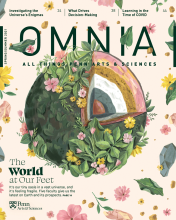A Time of Transition
A Message from Dean Steven J. Fluharty, Dean and Thomas S. Gates, Jr. Professor of Psychology, Pharmacology, and Neuroscience.

The life of a university is built around transitions, from the matriculation and graduation of our students to the day-to-day work of our scholars as they continually build, expand, and refine our understanding of the world.
This spring, the sense of transition that goes along with the end of athe academic year has been amplified. As vaccinations become widely available, we all can imagine moving from our virtual community back to our vibrant campus. But in looking forward to this, we recognize that in many ways, we are not the same school that we were before March 2020.
Despite—or because of—the hardships it imposed, the pandemic has been a catalyst for growth. Faculty like Evelyn Thomson, an associate professor of physics and astronomy who works at the cutting edge of experimental particle physics, explored new ways of increasing personal connections in online teaching, as a path to supporting students’ engagement in problem-solving. Such approaches piloted by outstanding teacher-scholars like Dr. Thomson in response to the crisis will now have a permanent impact, informing and enhancing teaching in the classroom.
The events of the past year also revealed some difficult truths about the persistent fissures in our society along racial, ethnic, and class lines. My colleagues in the dean’s office share my belief that higher education has yet to achieve its full potential to combat the inequality that continues to inflict such great harm. In November of last year, the School announced a series of inclusion and anti-racism initiatives, and we are now working purposefully to advance this agenda. A search for humanists and social scientists with expertise in Asian American studies will be an important focus for the School in the coming academic year and is the first major faculty recruitment effort to flow from our renewed commitment to inclusion. I am also pleased to announce the establishment of the Center for Latin American and Latinx Studies, which will be a focal point for showcasing our considerable faculty and programmatic strength in this area.
This month also brings us just weeks away from another significant transition: the conclusion of the Power of Penn Arts & Sciences Campaign. This campaign has been a force that has united us and expanded our vision for the future. Thanks to our supporters, we are now poised to transform the future of energy science at Penn through the Vagelos Institute and the new Vagelos Laboratory for Energy Science and Technology—a cross-disciplinary physical hub for cutting-edge energy research. We have enhanced scholarly leadership across disciplines through new endowed professorships, and we have increased the undergraduate financial aid endowment that opens the doors to a Penn education, regardless of a student’s economic background.
These are just a few examples of how the Power of Penn Arts & Sciences Campaign is already shaping our future. I look forward to telling you the full story of the campaign’s impact in coming months—and I hope that I’ll have the opportunity to share this story with many of you in person, in a safer, post-pandemic world.



